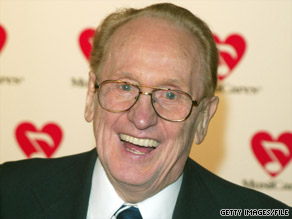Tempo de leitura: menos de 1 minuto
by Todd Leopold
A seção “Textos Mastigados” traz matérias extraídas, com a devida autorização, do site da CNN. As palavras e expressões menos comuns são traduzidas para facilitar a compreensão. Os links escondem armadilhas já esclarecidas no Tecla SAP. Bons estudos e até o próximo texto!
(CNN) — Les Paul, whose innovations with the electric guitar and studio technology made him one of the most important figures [personalidades] in recorded music, has died, according to a statement [declaração] from his publicists [empresários]. Paul was 94.
Paul died in White Plains, New York, from complications of severe [grave] pneumonia, according to the statement.
Paul was a guitar and electronics mastermind [gênio, criador] whose creations — such as multitrack recording [gravação multipista], tape delay [eco de fita] and the solid-body guitar [guitarra de corpo sólido, guitarra sólida] that bears [leva, carrega] his name, the Gibson Les Paul — helped give rise [possibilitou o surgimento] to modern popular music, including rock ‘n’ roll. No slouch [nada incompetente] on the guitar himself, he continued playing at clubs [bares, casas noturnas] into his 90s [depois dos 90 anos de idade] despite [apesar de] being hampered [limitado, atrapalhado] by arthritis [artrite].
 “If you only have two fingers [to work with], you have to think, how will you play that chord [acorde].” he told CNN.com in a 2002 phone interview. “So you think of how to replace that chord with several notes, and it gives the illusion of sounding like a chord.”
“If you only have two fingers [to work with], you have to think, how will you play that chord [acorde].” he told CNN.com in a 2002 phone interview. “So you think of how to replace that chord with several notes, and it gives the illusion of sounding like a chord.”
Guitarists mourned [lamentaram] the loss [perda] Thursday.
“Les Paul was truly [verdadeiramente] a ‘one of a kind [único, singular].’ We owe many of his inventions that made the rock ‘n roll sound of today to him [devemos a ele muitas das invenções…], and he was the founding father [precursor] of modern music,” B.B. King said in a statement. “This is a huge [enorme] loss to the music community and the world. I am honored to have known him.”
Joe Satriani said in a statement: “Les Paul set a standard [padrão] for musicianship [aptidão, habilidade (para tocar instrumento)] and innovation that remains unsurpassed [ainda não foi superado]. He was the original guitar hero and the kindest of souls [a mais doce das pessoas]. Last October I joined him onstage [no palco] at the Iridium club in New York, and he was still shredding [arrasando, detonando, fritando (inf.)]. He was and still [ainda] is an inspiration to us all.”
In a statement, Slash said, “Les Paul was a shining [brilhante] example of how full [completa] one’s life can be; he was so vibrant and full of positive energy.”
Lester William Polfuss was born in Waukesha, Wisconsin, on June 9, 1915. Even as a child he showed an aptitude [aptidão, jeito] for tinkering [mexer, fuçar], taking apart [desmontar] electric appliances [aparelhos] to see what made them tick [funcionar (inf.)].
“I had to build it, make it and perfect it,” Paul said in 2002. He was nicknamed [ganhou o apelido de] the “Wizard of Waukesha [Mago de Waukesha].”
In the 1930s and ’40s, he played with the bandleader Fred Waring and several [vários] big band [big band] singers, including Bing Crosby, Frank Sinatra and the Andrews Sisters, as well as with his own Les Paul Trio. In the early 1950s, he had a handful [um punhado] of huge hits [sucessos] with his then-wife [sua então esposa], Mary Ford, such as “How High the Moon” and “Vaya Con Dios.”
His guitar style, heavily influenced by jazzman [jazista] Django Reinhardt, featured [apresentava] lightning-quick runs [sequência de notas, escalas, arpejos] and double-time rhythms [ritmo dobrado]. In 1948, after being involved in a severe car accident, he asked the doctor to set [colocar] his arm [braço] permanently in a guitar-playing position.
Paul also credited Crosby for teaching him about timing, phrasing [fraseado] and preparation.
Crosby “didn’t say it, he did it — one time only. Unless [exceto] he blew the lyrics [errar a letra], he did one take [em um take, de primeira, de prima (inf.)].”
Paul never stopped tinkering with electronics, and after Crosby gave him an early [antigo] audiotape recorder [gravador (de fita)], Paul went to work changing it. It eventually led to multitrack recording; on Paul and Ford’s hits, he plays many of the guitar parts [grava a maioria das guitarras], and Ford harmonizes [faz a base, faz a harmonia] with herself. Multitrack recording is now the industry standard.
But Paul likely [provavelmente] will be best remembered for the Gibson Les Paul, a variation on the solid-body guitar he built in the early 1940s — “The Log” — and offered to the guitar company.
“For 10 years, I was a laugh [eu era motivo de riso],” he told CNN in an interview. “But I kept pounding at them and pounding at them [insistindo incansavelmente] saying hey, here’s where it’s at [essa é a situação de momento]. Here’s where tomorrow, this is it [No futuro, ela será imbatível]. You can drown out [fazer desaparecer; afogar (lit.)] anybody [qualquer um] with it. And you can make all these different sounds that you can’t do with a regular guitar.”
Gibson, spurred [pressionada] by rival Fender, finally took Paul up on his offer [aceitou a oferta de Paul] and introduced [lançou] the model in 1952. It has since become the go-to guitar [a guitarra preferida] for such performers [artistas] as Jimmy Page.
“The world has lost a truly innovative [inovador, criativo] and exceptional human being today. I cannot imagine life without Les Paul,” said Henry Juszkiewicz, chairman [presidente (do conselho de administração)] and CEO [presidente (executivo)] of Gibson Guitar, in a statement. “He would walk into a room and put a smile on anyone’s face. His musical charm was extraordinary and his techniques unmatched [incomparáveis] anywhere in the world.”
Paul is enshrined [ocupa lugar sagrado] in the Rock and Roll Hall of Fame, the Grammy Hall of Fame, the Inventors Hall of Fame and the Songwriters [compositores] Hall of Fame. He is survived by [deixa] three sons, a daughter, five grandchildren and five great-grandchildren [bisnetos]. Until recently he had a standing gig [show lotado (com o público de pé)] at New York’s Iridium Jazz Club, where he would play with a who’s who of famed musicians [astros da música].
He admired the places guitarists and engineers took his inventions, but he said there was nothing to replace [substituir] good, old-fashioned [bom e velho] elbow grease [trabalho duro; graxa no cotovelo (lit.)] and soul [alma].
“I learned a long time ago that one note can go a long way [tem muito valor] if it’s the right one,” he said in 2002, “and it will probably whip [superar, vencer, dar de goleada (inf.); chicotear (lit.)] the guy with 20 notes.”
Gostou do texto? Aprendeu alguma coisa nova e interessante? Comente e/ou clique nas estrelas amarelas para dar nota de 1 a 5. Envie link do artigo para seus amigos. Obrigado!
A tradução dos termos técnicos deste texto contou com o revisão de Diogo Cardoso, guitarrista, colega de banda e amigo (não necessariamente nessa ordem!). Valeu!

Minha humilde contribuição: “shredding”, no jargão guitarrístico, geralmente é “fritar”. Nem sempre “fritar” tem sentido pejorativo, o que acontece apenas quando o sujeito não faz outra coisa a não ser fritar – o que, certamente, não era o caso de Les Paul! Eu queria saber fritar, e tenho inveja de quem frita bem na guitarra, embora saiba que fritura sozinha não faz um bom guitarrista.
Parabéns pelo blog,
Renato
Renato,
Obrigado pela colaboração. Vou incluir “fritar” no texto agora mesmo. Valeu!
Abraços a todos
Ulisses,
Sempre leio “Textos Mastigados” gosto muito de aprender novas expressões e esse texto me deixou muito triste por tratar de um assunto que mexe muito com nós músicos.
Obrigado e continue fazendo esse trabalho maravilhoso.
Itibrão,
Obrigado pela mensagem simpática. Espero poder contar com a sua presença constante aqui nas páginas do blog. Valeu!
Abraços a todos
Ótimo texto!! Muitas expressões interessantes.
Uma pena o assunto, mas a morte faz parte da vida!!
Fernando,
Obrigado pelo comentário. Concordo plenamente com as suas palavras. Volte mais vezes.
Abraços a todos
Ulisses,
Gostei muito do texto, mas não da notícia…
Vários termos interessantes, como: “kept pounding at them and pounding at them” e “his then-wife”, também aprendi “founding father”.
Pena que a notícia é triste, muito triste.
O inventor da minha ‘go-to guitar’.
Regards.
Diogo,
Obrigado pelo comentário e pela ajuda na revisão das expressões técnicas. Aliás, vou reparar agora mesmo o equívoco de não ter dado o devido crédito no texto. Shame on me!
Abração